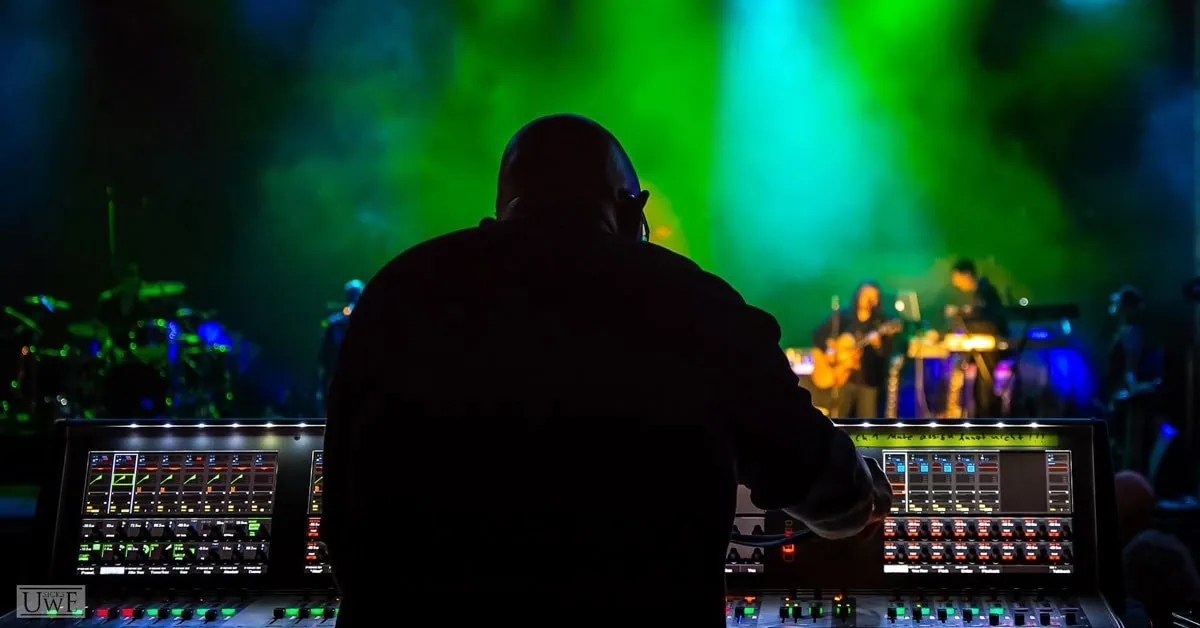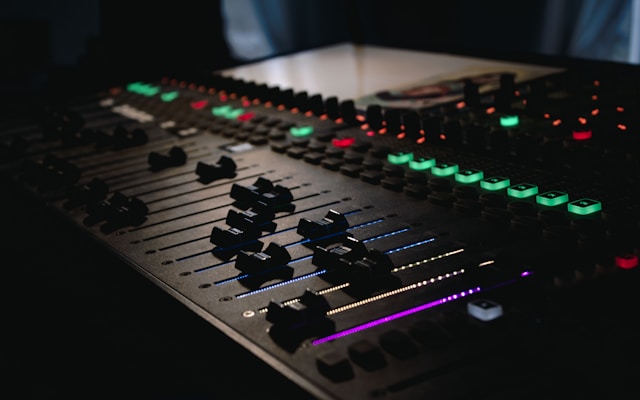Introduction
It just takes one faulty cable ruin a concert.... Now read on..
Every outstanding live performance is not just a showcase of musical prowess but also a testament to the sophisticated and often underappreciated art of sound engineering. Sound mixing and sound checks, though behind the scenes, play a pivotal role in shaping the auditory experience of any event. In the bustling live music scenes of cities like Bangalore, where diverse genres from classical orchestras to energetic Bollywood bands perform, the quality of sound can make or break an event. These tasks ensure that sound levels are meticulously balanced, equipment is finely tuned, and the acoustic environment of the venue is considered to deliver a crystal-clear sound that complements the musicians' talents. Furthermore, sound engineering extends beyond simple adjustments; it involves a deep understanding of acoustics, electronics, and audience psychology, making it integral to the success of live performances. This post aims to dive deep into the art and science of sound engineering, exploring how precise sound checks and expert sound mixing contribute to creating unforgettable live music experiences. By the end of this discussion, you will not only appreciate the complexity of this field but also understand the critical role that sound engineers play in bringing live music to life, ensuring that every beat, note, and tone resonates perfectly with the audience, regardless of the size and nature of the venue.
Understanding Sound Mixing
Sound mixing is a vital skill in the execution of any live show in Bangalore, involving a comprehensive array of techniques to ensure each element of the performance is audibly harmonious. At the heart of successful sound mixing is the ability to balance audio inputs from diverse sources—whether vocals, instruments, or digital tracks. This balance is crucial not only for clarity but also for delivering the emotional and artistic expressions intended by the performers. During a live performance in Bangalore, where different musical styles frequently converge, the challenge and importance of the sound mixer's role magnify. They must expertly adjust levels, tones, and effects in real-time to suit various acts and venue sizes, from cozy acoustic sets to grand rock concerts. This task demands both technical prowess with sophisticated mixing consoles and an artistic sensitivity that enhances the overall impact of the performance. An effective sound mixer has an ear trained to detect subtle nuances and the foresight to understand how adjustments will resonate with the audience. By finely managing the amplitude, frequency, and timbre of each sound source, the mixer ensures that the audience experiences a seamless and engaging musical blend, truly capturing the essence of the live show. This intricate blend of technology and artistry in sound mixing is what elevates a good performance into a spectacular live event, making the role of the sound mixer indispensable in the vibrant live music scene of Bangalore.
The Crucial Role of Sound Checks
Sound checks are fundamental to ensuring the success of any live show in Bangalore, serving as the final rehearsal to fine-tune the audio experience before the audience arrives. This meticulous process is crucial for detecting and addressing potential audio issues that could disrupt a live performance. During a sound check, engineers adjust levels to suit the specific acoustics of the venue, which might differ significantly between locations. Whether in an enclosed concert hall or an open-air festival, sound checks help tailor the sound system to environmental conditions. They are especially vital in a city like Bangalore, where live performances range from classical to contemporary genres, each requiring unique sound setups. Sound checks involve not only the technical adjustment of equipment but also a close collaboration with the performers. Musicians and sound engineers work together to ensure that every instrument is correctly balanced and that the sound matches the performers’ expectations. This collaboration is essential for managing on-stage sound dynamics, such as the interplay between vocals and instruments, which can be particularly challenging in live environments. By conducting thorough sound checks, engineers can prevent problems like feedback loops, ensure all equipment is correctly calibrated, and confirm that the sound levels are comfortable for both the performers and the audience. This process is essential not just for the quality of the sound but also for the confidence of the performers, who rely on the clarity and balance of their monitors to deliver their best performance. In essence, the sound check is not merely a technical routine but a critical prelude to any successful live show in Bangalore, setting the stage for a performance that is both technically sound and artistically fulfilling.

Indoor vs Outdoor Venues
Sound engineering for live performances requires a tailored approach depending on the venue, with distinct strategies necessary for indoor and outdoor settings. Indoor venues, like concert halls and theaters in Bangalore, typically involve managing acoustics that naturally enhance or dampen sound due to their enclosed structure. Here, sound engineers must carefully manage sound reflection and absorption, using tools like equalizers to prevent echo and ensure clarity. This involves not only technical adjustments but also an understanding of how sound behaves in closed spaces, where issues such as reverberation and sound interference can dramatically affect the quality of a live show in Bangalore. Conversely, outdoor venues present a different set of challenges and opportunities. Without walls to contain and direct sound, engineers must design systems that project audio clearly over larger areas, combating environmental factors such as wind, humidity, and background noise—all of which can alter sound transmission. For outdoor live performances in Bangalore, this might mean deploying more robust speaker systems and employing strategies to minimize noise pollution. Additionally, the unpredictable nature of outdoor events requires sound engineers to be exceptionally adaptable, ready to modify their setups in response to changing weather conditions or audience dynamics. For instance, a sudden rain can dampen the acoustics or a larger-than-expected crowd can absorb more sound, necessitating quick adjustments to amplifier settings or speaker placement. Effective sound engineering for both indoor and outdoor venues is crucial for the success of live performances, ensuring that every note is delivered with precision and that the auditory experience is immersive and engaging for every member of the audience. This detailed attention to the specific demands of different environments underscores the versatility and skill required of sound engineers in Bangalore’s dynamic live music scene.
Deep Dive: Equipment and Techniques
- Microphone Selection: The choice between wired and wireless microphones can impact sound quality and flexibility. Wired microphones, typically more reliable and less prone to interference, are preferred in controlled settings, whereas wireless systems offer mobility, crucial for dynamic performances at large venues.
- Monitoring Systems: On-stage monitors are vital for performers to hear themselves and each other without delays. The configuration of these monitors, whether in-ear or traditional stage monitors, can drastically affect a performer's ability to stay in time and tune with the band.
- Handling Frequency Ranges: Managing the frequency range effectively ensures that low, mid, and high frequencies are well balanced. Sound engineers must fine-tune frequencies to accommodate the specific acoustics of the venue, preventing issues like muddiness or piercing highs.
- Addressing Feedback Loops: Feedback, often caused by microphones picking up sounds from speakers, can ruin a performance. Engineers use sound checks to identify potential feedback frequencies and adjust the system to minimize risks.
Practical Examples and Case Studies
Examining real-world applications of sound engineering in the bustling live music scene of Bangalore provides invaluable insights into the challenges and solutions encountered during live performances. For instance, consider a live show at one of Bangalore's popular outdoor venues. The sound engineer faced a significant challenge due to unexpected weather changes, which affected the sound dynamics drastically. By quickly adapting their approach, employing high-grade waterproof covers for equipment, and recalibrating the sound system to compensate for the dampened acoustics caused by the rain, the engineer ensured that the live performance did not lose its vibrancy and that the audience enjoyed an uninterrupted musical experience. Another example from an indoor venue, where acoustic challenges like echo and sound bleed are prevalent, showcases a sound engineer deploying advanced sound absorption panels and strategic speaker placement to enhance sound clarity and audience engagement during a live show in Bangalore.
In another case, during a high-energy rock concert, the feedback issue became apparent as soon as the live performance in Bangalore commenced. The sound engineer swiftly identified that the feedback was primarily coming from a set of improperly aligned stage monitors. By adjusting the angle and position of these monitors, and tweaking the equalizer settings on the fly, the feedback was eliminated, allowing the band to deliver a stellar performance without further audio disturbances. This example not only highlights the importance of real-time problem-solving skills but also underscores the critical role of pre-show sound checks.
Additionally, a unique scenario unfolded during a classical music concert in a venerable Bangalore auditorium. Here, the challenge was to maintain the natural tone and richness of acoustic instruments like violins and cellos in a large, reverberant space. The sound engineer utilized a combination of directional microphones and subtle ambient miking techniques to capture the true essence of the instruments while preserving the natural acoustic environment of the venue. This meticulous approach ensured that the live performance resonated well with the connoisseurs present, providing an immersive and authentic listening experience. These practical examples from various live shows in Bangalore demonstrate the diverse challenges faced by sound engineers and the creative solutions they employ to ensure that every live performance reaches its highest auditory potential.
The Importance of Taking Time for Sound Checks
The comprehensive sound check is an indispensable part of preparing for any live show in Bangalore, serving as the final and perhaps most critical phase before the curtains rise. This detailed process is not just about checking the technical sound levels; it's an intricate rehearsal that involves every musician and technical staff member, ensuring that all elements of the performance are harmoniously synced. For sound engineers, this time is crucial to make precise adjustments that accommodate the unique characteristics of each venue, whether adjusting for an indoor setting with its reverberative acoustics or for an open-air concert where sound disperses freely. This meticulous attention to detail during sound checks ensures that issues such as feedback loops, dead spots in the venue, and unbalanced sound levels are addressed well before the audience arrives.
During a live performance, the sound check process also allows the sound team to collaborate closely with the performers. This collaboration is vital for understanding the artists' vision and how they interact with their instruments and the audience. For example, drummers might require a specific mix in their monitors to keep time effectively, or vocalists might need adjustments to their microphones to match their dynamic range during the performance. These personalized adjustments are critical in delivering a performance where the music not only reaches but also moves the audience. Taking ample time for sound checks can significantly elevate the quality of the live show, turning what could be a routine performance into an extraordinary event.
Furthermore, the duration and thoroughness of sound checks can directly impact the confidence and performance quality of the musicians. When artists are assured that the sound is precisely tuned to their needs, they can perform with greater confidence and freedom, leading to a more engaging live show. This is particularly important in a culturally rich and musically diverse city like Bangalore, where audiences have discerning tastes and high expectations from live performances. Ensuring that every guitar strum, every keyboard note, and every vocal nuance is clearly and beautifully conveyed requires that every possible sound issue is foreseen and corrected during the sound check. By dedicating sufficient time to this phase, sound engineers not only safeguard the performance against technical glitches but also contribute to the overall success of the event, making it a memorable experience for everyone involved.
Conclusion
In conclusion, the next time you attend a live show in Bangalore, take a moment to appreciate the complex interplay of technology and artistry that goes into producing the sounds that move you. The expert touch of sound engineers ensures that the music not only sounds good but also encapsulates the essence of the live performance, enhancing the emotional and sensory enjoyment of the music. Their role is indispensable in transforming a simple gathering into a spectacular showcase of auditory art that leaves the audience enthralled and longing for more.
Back to Blog List

